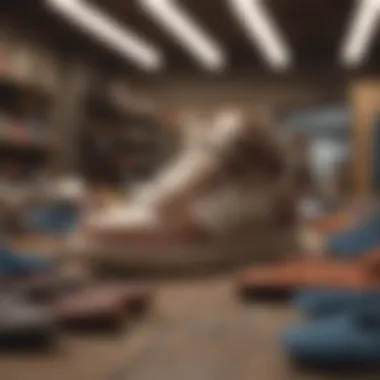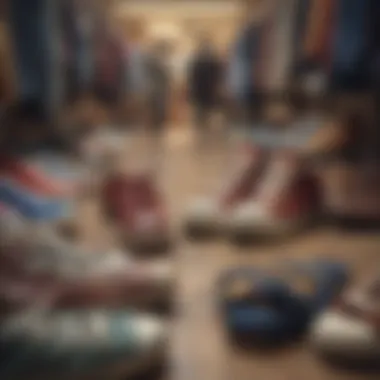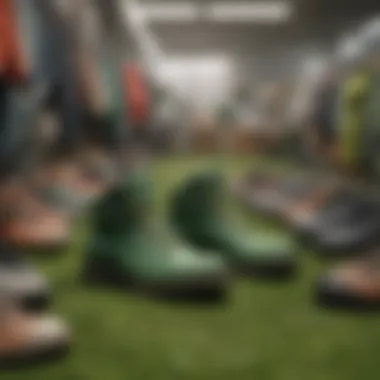Unveiling the Lucrative Realm of Second-Hand Shoes and Clothing Sales


Understanding Personal Finances
Budgeting Techniques
In the realm of used shoes and clothes for sale, having a firm grasp on personal finances is paramount. Budgeting techniques play a crucial role in managing expenses and ensuring financial stability. Buyers and sellers alike should track their purchases and sales meticulously to avoid overspending or underpricing items. By setting clear financial goals, individuals can navigate the market with purpose and direction.
Investing Strategies
Introduction to Investing Understanding the intricacies of investing is key to maximizing profits in the second-hand fashion market. Risk Management is essential, especially when dealing with fluctuating prices and demand. Diversification of products and platforms can help mitigate potential losses, providing a cushion against market volatility.
Retirement Planning
Retirement Savings Plans While the focus may be on immediate transactions, it's crucial to consider retirement savings plans. Sellers can allocate a portion of their earnings towards future security, utilizing platforms like Social Security Benefits efficiently. Anticipating healthcare costs is also pivotal for long-term financial health.
Financial Products Overview
Types of Investment Vehicles Navigating the diverse landscape of financial products is akin to exploring a vast marketplace. Understanding the intricacies of investment vehicles, such as stocks, bonds, and mutual funds, empowers individuals to make informed decisions. Moreover, discerning the benefits of traditional tools like savings accounts versus modern options like digital assets is essential.
Expert Insights and Tips
Financial Advisor Recommendations Seeking expert guidance in this dynamic market is akin to having a seasoned navigator on a voyage. Financial advisors provide valuable insights on market trends and analysis, guiding individuals towards profitable transactions. Tax planning strategies offer a strategic advantage, optimizing financial outcomes and compliance.
Prelude to the Second-Hand Market


Historical Evolution
The origins of selling used items
The inception of selling pre-owned goods dates back centuries, where bartering and exchanges were fundamental. This historical evolution resonates with the ethos of sustainability and resourcefulness. The key characteristic of selling used items lies in its longevity and relevance through changing socioeconomic landscapes. The unique feature of this tradition is its innate ability to reduce waste and foster communal relationships. Embracing the origins of selling used items offers a glimpse into our past practices while emphasizing the enduring value of thrift and eco-conscious consumerism.
Current Landscape
Trends in second-hand fashion
The current landscape of second-hand fashion showcases a shift towards conscious consumerism and circular economy principles. Trends in second-hand fashion highlight the increasing preference for unique, high-quality items with minimal environmental impact. This key characteristic stems from the growing awareness of the fashion industry's ecological footprint and the desire for more sustainable alternatives. Embracing second-hand fashion trends presents an opportunity to redefine personal style while contributing to a greener future. The unique feature of these trends is their ability to blend affordability and ethical practices seamlessly, catering to a diverse range of fashion enthusiasts.
Economic Significance
Revenue generated from resale
The economic significance of reselling pre-owned fashion items extends beyond profitability to encompass social and environmental value. Revenue generated from resale magnifies the circular economy's potential in reducing waste and fostering a culture of reuse. The key characteristic of this revenue stream lies in its ability to create a diverse marketplace that values uniqueness and heritage. The unique feature of this model is its capacity to unlock untapped value in previously owned goods, propelling the secondary market to new heights of innovation and inclusivity.
Consumer Behavior and Motivations
In delving into the market of used shoes and clothes for sale, understanding consumer behavior and motivations is paramount. The intricacies of why individuals choose to purchase pre-owned fashion items like shoes and clothes shed light on broader trends and preferences shaping the second-hand market. This section aims to dissect the underlying factors that drive consumers towards buying used goods, presenting a nuanced view of their preferences and choices when it comes to sustainable fashion.
Psychological Factors
Reasons for purchasing used goods


When considering the reasons behind purchasing used goods in the second-hand market, several key aspects come into play. The affordability and unique finds contribute significantly to the appeal of buying pre-owned fashion items. Consumers are drawn to the idea of owning one-of-a-kind pieces that exude individuality and style. Additionally, the eco-conscious mindset of repurposing and reusing aligns with the growing trend of sustainability in fashion.
Sustainability Consciousness
Impact on the environment
The impact of buying and selling used shoes and clothes goes beyond personal style choices; it extends to the broader environmental implications. By actively participating in the second-hand market, consumers contribute to reducing waste and embracing a circular fashion economy. The consciousness towards sustainability motivates individuals to opt for pre-owned items, emphasizing the importance of environmental conservation and mindful consumption.
Fashion Trends Influence
Role of trends in buying pre-owned fashion
Fashion trends play a pivotal role in influencing consumers' decisions when it comes to purchasing pre-owned fashion items. The concept of reviving past styles and embracing vintage aesthetics aligns with the cyclical nature of fashion. Consumers appreciate the nostalgia and authenticity that vintage pieces bring, adding a unique touch to their wardrobes. The trend-driven approach to buying pre-owned fashion reflects a harmonious blend of sustainability and style, catering to individuals seeking both eco-conscious choices and fashionable statements.
Marketing Strategies in Reselling Industry
The employment of marketing strategies in the reselling industry plays a vital role in amplifying the visibility and profitability of businesses dealing with pre-owned fashion items. By strategically aligning branding efforts with consumer demands and market trends, resellers can carve a distinct niche in the competitive landscape. Marketing strategies encompass a plethora of techniques such as targeted promotions, influencer collaborations, and omnichannel campaigns to engage diverse customer segments. Through astute market analysis and dynamic messaging, reselling businesses can establish authenticity and credibility, fostering long-term customer relationships.
Online Platforms Dominance
E-commerce impact on second-hand sales
The influence of e-commerce on second-hand sales is paramount in reshaping the retail landscape. E-commerce platforms offer resellers a global reach, enabling seamless transactions and wider market penetration. The convenience of online shopping coupled with secure payment gateways enhances the consumer experience, driving sales and brand loyalty. Moreover, e-commerce facilitates real-time inventory management and personalized recommendations, optimizing the shopping journey for buyers. Despite facing challenges related to product authentication and counterfeit items, e-commerce remains a favored channel for reselling due to its scalability and digitization of operations.
Social Media Influence


Marketing through social platforms
The utilization of social media platforms as marketing tools revolutionizes brand visibility and customer engagement. Resellers leverage social platforms' visual appeal and interactive features to showcase products, connect with consumers, and garner feedback in real-time. With the power of viral marketing through shares and reposts, social media exponentially amplifies brand awareness and drives traffic to reselling websites. However, maintaining a consistent brand voice and monitoring online reviews are imperative to manage reputation and credibility in the competitive social media landscape.
Brand Collaborations
Partnerships between resale companies and brands
Collaborations between resale companies and mainstream brands forge mutually beneficial relationships, offering unique products and expanding market reach. By aligning with established brands, resellers enhance their perceived value and access a broader customer base. Partnerships enable the exchange of expertise, resources, and creative ideas, resulting in exclusive collections that resonate with diverse consumer preferences. While such collaborations elevate brand positioning and credibility, maintaining brand integrity and shared brand values are essential factors for successful partnerships.
Challenges and Opportunities
In the multifaceted world of the resale industry, delving into the realm of challenges and opportunities is indispensable. It serves as a compass, guiding businesses through the turbulent waters of the second-hand market. Recognizing and preempting obstacles while capitalizing on favorable circumstances can spell the difference between success and stagnation.
Quality Control Issues
Ensuring product authenticity and condition
Quality control stands as the cornerstone of trust in the pre-owned fashion arena. Guaranteeing that items are genuine and in impeccable condition is not merely a choice but a vital necessity for both buyers and sellers. The stringent adherence to authenticity verifies the integrity of the merchandise, fostering credibility and repeat business. Despite its time-consuming nature, the meticulous attention to product condition assures customer satisfaction and loyalty. This meticulous process safeguards against counterfeit goods infiltrating the market, perpetuating the industry's reliability.
Competition from Fast Fashion
Balancing competition from new clothing retailers
Navigating the competitive landscape against fast fashion giants presents a perpetual challenge. Striking a balance between the allure of low-priced, trendy items and the enduring quality of pre-owned fashion is a delicate dance. Acknowledging the appeal of quick, disposable styles while championing sustainability and individuality sets resale businesses apart. By showcasing the unique value proposition of second-hand garments - their eco-conscious origins and timeless appeal - players in the resale market can counter the ephemeral nature of fast fashion.
Upcycling and Creative Solutions
Innovative approaches to repurposing clothing
Embracing innovation through upcycling breathes new life into used clothing, making waves in the fashion sustainability realm. The process of transforming discarded garments into fresh, trend-forward pieces challenges traditional notions of consumption. By infusing creativity and ingenuity into repurposed fashion, sellers ignite consumer interest and push the boundaries of circular fashion. Upcycling not only reduces textile waste but also fosters a community ethos centered around craftsmanship and eco-responsibility, carving a niche in the increasingly discerning market.







